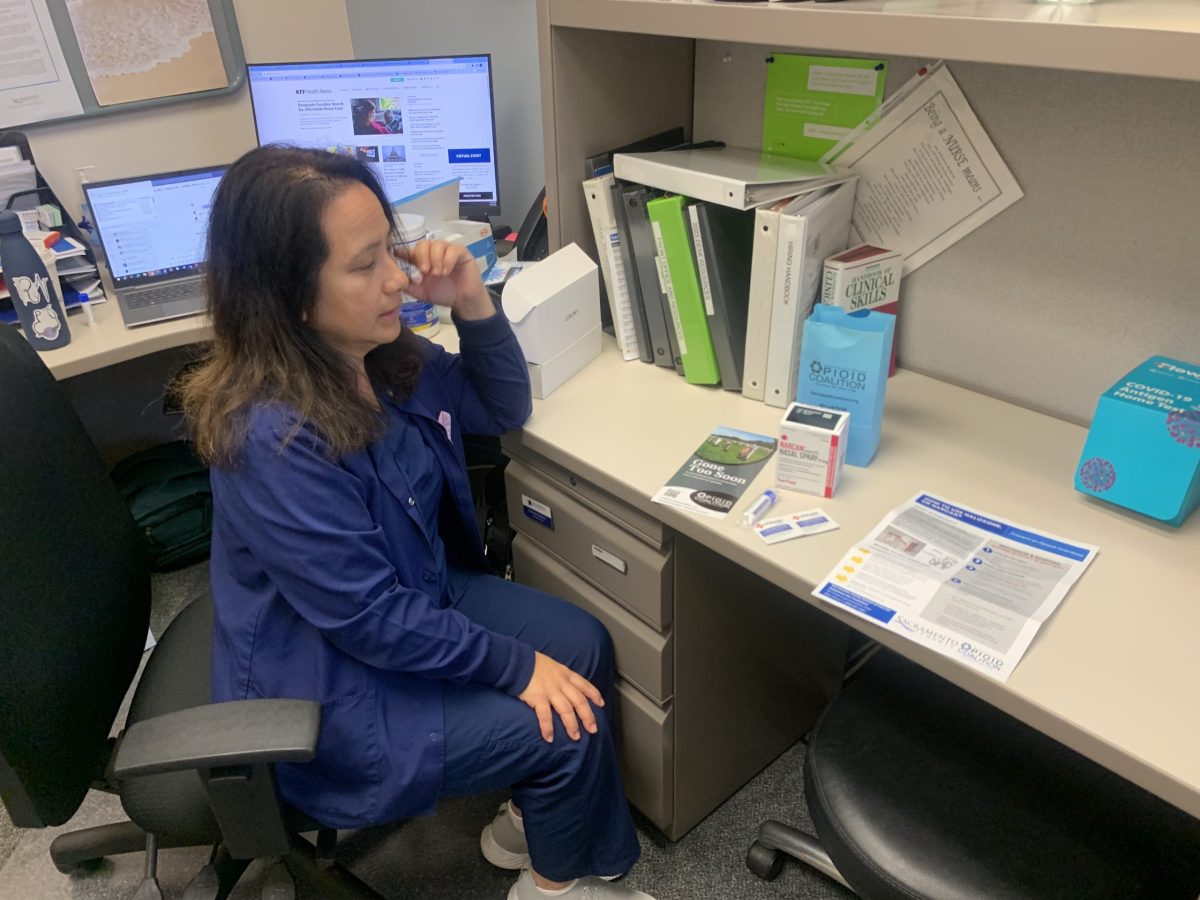College Nurse Michelle Barkley sat in her office and unpacked a small blue bag provided to her team by the Sacramento County Opioid Coalition.
The bag contained a pair of alcohol prep pads, a tube of chapstick, an instructional pamphlet and a 4 milligram box of Narcan nasal spray. Narcan, the common name for the drug Naloxone, is sometimes called “The Lazarus drug” because it can reverse the effects of a fatal opioid overdose.
“This stuff saves lives,” Barkley said as she held the box, which is to remain unopened until needed, per the instructions printed on its side.
CRC has been providing Narcan to students since late 2022 and the blue bag is similar to one CRC will provide students starting Jan. 1. In 2024 it will also contain fentanyl testing strips as required by all community colleges and CSU campuses per Assembly Bill 461.
“In January we will have both Narcan and fentanyl strips in a little package,” Barkley said. “We are required by law to have them and do a little bit of education on the use of it and offer support in helping to quit.”
The addition of the testing strips indicates that CRC has joined in the nationwide college campus harm reduction conversation, one that acknowledges that students might experiment with drugs that could contain fentanyl and aims to prevent their deaths.
“Kids are going to experiment. They’re adolescents. They think they’re invincible. They’re risk takers,” Barkley, a mother of two teenagers, said. “We all were. And we just don’t know who’s going to put what where.”
Fentanyl is a highly-potent and deadly synthetic opioid drug. More than 106,000 fentanyl-related deaths were reported in the United States between May 2022 to May 2023, according to the American Medical Association.
A two milligram dose of fentanyl powder (one pencil tip) is a lethal amount for most people, according to the United States Drug Enforcement Administration. Music icon Prince, rapper Mac Miller, and actors Angus McCloud and Michael K. Williams are just some of the high-profile deaths from the drug which has many street names including Apache, China Doll and Goodfellas.
Proper use of a Narcan inhaler and a fentanyl testing strip were showcased during a “Harm Reduction and Advocacy Workshop” hosted by the Pride Center and the Sacramento LGBT Community Center on Nov. 15. The event occurred just four days after the last reported fentanyl-related drug death in Sacramento County, the 275th this year, according to a reporting dashboard from the Sacramento County Coroner’s Office.
“One of the harm reduction principles is to meet people where they are at. There are a lot of stigmas,” said Amari Owens, a Harm Reduction Community Organizer with the Sacramento LGBT Community Center. Owens and others provided students with harm reduction tools like condoms and pregnancy tests in addition to Narcan and fentanyl testing strips at the event.
“It’s an epidemic that’s happening in our communities and nationwide,” said Jennifer Martinez, a Pride Center Specialist, of the opioid crisis. “It’s important to raise awareness to these issues and also find ways to prevent them and take action.”
Barkley said she will be providing an education piece in the form of a QR code with the sprays and strips on why to use, how to use and resources and support.
“We don’t just want to hand it out willy-nilly,” Barkley said. “We wanted to have an effective way to have students feel safe coming to get it.”
Umoja Student Leader Marquis Hardman said he was really proud of the campus for taking the steps to provide harm-reduction tools and education to students.
“I grew up in an area where opioid overdose was very well known. It was definitely happening because of a lack of resources,” Hardman said. “It’s really smart that the campus is offering (Narcan) to students who can either provide that for somebody that they know who is dealing with opioid abuse or to use for themselves.”
Barkley said she’s had to reshape her views on the harm reduction conversation, which is often criticized for enabling addicts and addiction.
“I’ve seen different scenarios with it. For the person that is still skeptical of the person who is going to continue to use, there is still hope you may reach that person,” Barkley said.


Russell Ward • Dec 8, 2023 at 12:24 pm
Great reporting on a good thing… or at least good relative to the really bad thing that makes the good thing necessary. Hopefully more campuses will follow this lead.